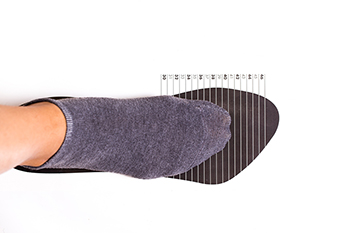
Diabetic foot ulcers are open wounds that develop on the feet, toes, or ankles due to reduced blood flow and nerve damage caused by diabetes. Diabetic foot ulcers are often painless, which means patients may not realize they have one until it becomes infected. Infections can spread quickly into deeper tissue, increasing the risk of bone involvement or even sepsis. Poor circulation slows the healing process, making these ulcers harder to treat. A podiatrist can help by assessing the severity of the ulcer, cleaning the wound, and applying protective dressings to reduce infection risk. In some cases, patients may need pressure-relieving footwear, a cast, or surgery to remove damaged tissue. Infected ulcers often require antibiotics, and severe infections may need hospital care. Regular foot care is important to avoid complications from diabetic foot ulcers. If you have foot ulcers as a result of diabetes, it is suggested that you are under the care of a podiatrist for ongoing treatment.
Diabetic foot care is important in preventing foot ailments such as ulcers. If you are suffering from diabetes or have any other concerns about your feet, contact one of our podiatrists from Quad Cities Foot and Ankle Associates. Our doctors can provide the care you need to keep you pain-free and on your feet.
Diabetic Foot Care
Diabetes affects millions of people every year. The condition can damage blood vessels in many parts of the body, especially the feet. Because of this, taking care of your feet is essential if you have diabetes, and having a podiatrist help monitor your foot health is highly recommended.
The Importance of Caring for Your Feet
- Routinely inspect your feet for bruises or sores.
- Wear socks that fit your feet comfortably.
- Wear comfortable shoes that provide adequate support.
Patients with diabetes should have their doctor monitor their blood levels, as blood sugar levels play such a huge role in diabetic care. Monitoring these levels on a regular basis is highly advised.
It is always best to inform your healthcare professional of any concerns you may have regarding your feet, especially for diabetic patients. Early treatment and routine foot examinations are keys to maintaining proper health, especially because severe complications can arise if proper treatment is not applied.
If you have any questions please feel free to contact our offices located in Bettendorf, and DeWitt, IA and Rock Island, IL . We offer the newest diagnostic and treatment technologies for all your foot and ankle needs.

Field hockey is a fast-paced sport played on turf or grass, where players use curved sticks to hit a ball toward the opposing team’s goal. Popular worldwide, the sport demands quick movements, sudden stops, and rapid direction changes, all of which put players at risk for ankle sprains. Ankle sprains happen when the foot twists awkwardly, overstretching or tearing ligaments. In field hockey, this can occur from cutting movements, uneven playing surfaces, or accidental contact with another player’s stick or foot. Other common foot and ankle injuries in this sport include fractures, tendonitis, and turf toe, often caused by wearing improper footwear, and the high-impact nature of the game. Wearing supportive shoes, strengthening the ankle muscles, and taping or bracing weak ankles can help prevent injuries. If you enjoy playing field hockey and have sustained a foot or ankle injury, it is suggested that you see a podiatrist for appropriate treatment.
Sports related foot and ankle injuries require proper treatment before players can go back to their regular routines. For more information, contact one of our podiatrists of Quad Cities Foot and Ankle Associates. Our doctors can provide the care you need to keep you pain-free and on your feet.
Sports Related Foot and Ankle Injuries
Foot and ankle injuries are a common occurrence when it comes to athletes of any sport. While many athletes dismiss the initial aches and pains, the truth is that ignoring potential foot and ankle injuries can lead to serious problems. As athletes continue to place pressure and strain the area further, a mild injury can turn into something as serious as a rupture and may lead to a permanent disability. There are many factors that contribute to sports related foot and ankle injuries, which include failure to warm up properly, not providing support or wearing bad footwear. Common injuries and conditions athletes face, including:
- Plantar Fasciitis
- Plantar Fasciosis
- Achilles Tendinitis
- Achilles Tendon Rupture
- Ankle Sprains
Sports related injuries are commonly treated using the RICE method. This includes rest, applying ice to the injured area, compression and elevating the ankle. More serious sprains and injuries may require surgery, which could include arthroscopic and reconstructive surgery. Rehabilitation and therapy may also be required in order to get any recovering athlete to become fully functional again. Any unusual aches and pains an athlete sustains must be evaluated by a licensed, reputable medical professional.
If you have any questions please feel free to contact our offices located in Bettendorf, and DeWitt, IA and Rock Island, IL . We offer the newest diagnostic and treatment technologies for all your foot and ankle needs.

Ankle pain can result from various conditions, with sprains, arthritis, osteoarthritis, and tendinitis being some of the most common causes. A sprained ankle occurs when ligaments are stretched or torn, leading to pain, swelling, and bruising. Arthritis and osteoarthritis cause joint inflammation, resulting in stiffness, swelling, and chronic pain. Osteoarthritis, in particular, wears down cartilage, leading to bone-on-bone friction. Tendinitis occurs when the tendons surrounding the ankle become inflamed, causing pain, swelling, and limited range of motion. The symptoms of ankle pain can vary depending on the cause, but they generally include swelling, tenderness, difficulty moving the ankle, and, in some cases, instability. Activities like walking, running, or standing may become painful or difficult. A podiatrist can diagnose the cause of your ankle pain and recommend treatment, including targeted exercises, medication, orthotics, or, in severe cases, surgery. If you have ankle pain, it is suggested that you schedule an appointment with a podiatrist.
Ankle pain can be caused by a number of problems and may be potentially serious. If you have ankle pain, consult with one of our podiatrists from Quad Cities Foot and Ankle Associates. Our doctors will assess your condition and provide you with quality foot and ankle treatment.
Ankle pain is any condition that causes pain in the ankle. Due to the fact that the ankle consists of tendons, muscles, bones, and ligaments, ankle pain can come from a number of different conditions.
Causes
The most common causes of ankle pain include:
- Types of arthritis (rheumatoid, osteoarthritis, and gout)
- Ankle sprains
- Broken ankles
- Achilles tendonitis
- Achilles tendon rupture
- Stress fractures
- Bursitis
- Tarsal tunnel syndrome
- Plantar fasciitis
Symptoms
Symptoms of ankle injury vary based upon the condition. Pain may include general pain and discomfort, swelling, aching, redness, bruising, burning or stabbing sensations, and/or loss of sensation.
Diagnosis
Due to the wide variety of potential causes of ankle pain, podiatrists will utilize a number of different methods to properly diagnose ankle pain. This can include asking for personal and family medical histories and of any recent injuries. Further diagnosis may include sensation tests, a physical examination, and potentially x-rays or other imaging tests.
Treatment
Just as the range of causes varies widely, so do treatments. Some more common treatments are rest, ice packs, keeping pressure off the foot, orthotics and braces, medication for inflammation and pain, and surgery.
If you have any questions, please feel free to contact our offices located in Bettendorf, and DeWitt, IA and Rock Island, IL . We offer the newest diagnostic and treatment technologies for all your foot care needs.

Wearing the correct shoe size is essential for maintaining foot health and overall comfort. Shoes that are too tight or too loose can lead to foot conditions that cause pain and discomfort. Neuropathy, which affects nerve function, can be worsened by wearing ill-fitting shoes that create pressure points and reduce circulation. Persistent foot pain may develop due to a lack of proper support, leading to difficulty in walking and standing. Ingrown toenails are a common issue when shoes squeeze the toes, causing the nail to grow into the surrounding skin. Over time, these problems can contribute to a decreased quality of life by limiting mobility and daily activities. If you have foot pain from wearing shoes that do not fit correctly, it is suggested that you consult a podiatrist who can treat various foot conditions and guide you on how to determine your correct shoe size.
It is important to find shoes that fit you properly in order to avoid a variety of different foot problems. For more information about treatment, contact one of our podiatrists from Quad Cities Foot and Ankle Associates. Our doctors will treat your foot and ankle needs.
Proper Shoe Fitting
Shoes have many different functions. They cushion our body weight, protect our feet, and allow us to safely play sports. You should always make sure that the shoes you wear fit you properly in order to avoid injuries and deformities such as: bunions, corns, calluses, hammertoes, plantar fasciitis, stress fractures, and more. It is important to note that although a certain pair of shoes might be a great fit for someone else, that doesn’t mean they will be a great fit for you. This is why you should always try on shoes before buying them to make sure they are worth the investment. Typically, shoes need to be replaced ever six months to one year of regular use.
Tips for Proper Shoe Fitting
- Select a shoe that is shaped like your foot
- Don’t buy shoes that fit too tight, expecting them to stretch to fit
- Make sure there is enough space (3/8” to ½”) for your longest toe at the end of each shoe when you are standing up
- Walk in the shoes to make sure they fit and feel right
- Don’t select shoes by the size marked inside the shoe, but by how the shoe fits your foot
The shoes you buy should always feel as good as they look. Shoes that fit properly will last longer, feel better, and improve your way of life each day.
If you have any questions, please feel free to contact our offices located in Bettendorf, and DeWitt, IA and Rock Island, IL . We offer the newest diagnostic and treatment technologies for all your foot care needs.
